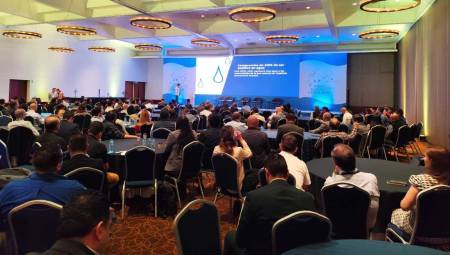Latin America. People around the world are stepping up their efforts to prevent climate change, according to the latest results from Epson's second Climate Reality Barometer. Research from the global technology leader suggests that while the global economy proves to be a distraction from efforts to address climate challenges, climate change remains a major concern for many.
Despite a year of unprecedented climate impacts, the survey also reveals that people believe a climate disaster can be avoided over the course of their lifetime, although the data also shows that there are significant variations in confidence levels, driven by factors such as economics and age.
"Epson's 2022 Climate Reality Barometer shows progress, but also indicates that short-term economic demands can distract governments, businesses and individuals from immediate environmental action," said Keith Kratzberg, president and CEO of Epson America. "With tools like the climate barometer survey, we are better equipped to make informed decisions by being able to understand public attitudes about the climate crisis."
Optimism: influenced by economics and age
Unsurprisingly, immediate financial problems are people's main concern. From a global perspective, "fixing the economy" (22%) and "rising prices" (21%) topped respondents' priority list, followed by climate change at third place (20%). The climate crisis remains a priority for many people around the world, despite the global economic downturn, conflicts and rising energy bills.
However, climate concerns do not lead to pessimism. Before the COP26 conference in November 2021, 46% of respondents globally were optimistic that a climate catastrophe could be avoided in their lifetime. As the world prepares for this year's COP27 conference in Egypt, optimism has risen to more than 48%.
Digging even deeper, it is clear that global averages mask surprising regional variations in confidence levels. For example, optimism in most developed economies is lower than in emerging economies.
Each G7 member country is significantly less than the global average of 48%: Canada (36.6%); France (22.5%); Germany (23.8%); Italy (25.2%); Japan (10.4%); United Kingdom (28.4%); and the United States (39.4%).
Emerging and fast-growing economies have levels of climate optimism significantly higher than the global average: China (76.2%); India (78.3%); Indonesia (62.6 per cent); Kenya (76%); Mexico (66%); and the Philippines (71.9%).
"Epson's corporate purpose is focused on improving life and the planet, and we will dedicate significant resources to achieve this. As the world gathers for the COP27 conference, our Climate Reality Barometer aims to raise awareness and empower transformative change. We hope that the results of the Barometer can help governments, industries and individuals step up their efforts to avert climate disaster. While we know there is a long way to go, we believe we can build a better future if we work together and act now," said Yasunori Ogawa, CEO of Epson.
Reality, influence and action around the world
In 2022, the Intergovernmental Panel on Climate Change (IPCC) announced that "human-induced climate change is causing dangerous and widespread disruption to nature and affecting the lives of billions of people around the world..." This year alone, the disruption has encompassed adverse weather events on all continents, such as: decades-long megadroughts in Africa and South America; rapid warming of both the Arctic and Antarctic; severe flooding in Asia and Australasia; unprecedented temperatures across Europe; and disappearing lakes in North America.
"The harsh reality is that the last seven years have been the warmest on record, and we are at real risk of exceeding safe temperature limits. However, this survey shows that people around the world believe that their actions, along with those of government and business, can help improve society. The immediate challenges facing economies around the world, including rising energy and food prices, are causes and symptoms of climate change. Planning for the long term and enabling people to take action to protect the environment is currently the most important action countries can take to maintain climate optimism, reduce carbon pollution and build resilience to climate impacts", said Dr Tara Shine, Environmental Scientist and Deputy Executive Director of Change by Degrees.
Unconditional optimism may be seen as wishful thinking, but Epson's results show that respondents recognize the impacts of climate change. More than eight in 10 people (80.2%) consider seeing with their own eyes (witnessing climate change in everyday life) to be the most influential factor in raising awareness. Other significant influences of climate information include the following:
● 75.7% mention government actions and/or campaigns
● 75% mention news online and through mainstream media
● 74.2% mention social media
● 64.8% mention business or community campaigns
● 64% mention COP conferences
In 2022, it seems that optimism does not lead to complacency, but encourages people to action. Between 2021 and 2022:
● the number of respondents who have started or plan to start walking or cycling more frequently has increased from 83.7% to 87.2%, while 31.8% of such people have been doing so for more than a year;
● the number of respondents who have started or plan to start using renewable energy has increased from 78.2% to 82.4%, while 18.6% of these people have been doing so for more than a year;
● the number of respondents who have decreased or plan to decrease international travel for business or pleasure has increased from 65.1% to 68.2%, while 23% of such people have been doing so for more than a year;
● the number of respondents who have started or plan to start using electric vehicles has increased from 68% to 72.7%, while 10.6% of those people have been doing so for more than a year;
● The number of respondents who have adopted or plan to adopt a plant-based diet has increased from 67.6% to 68.9%, while 16.5% of those people have been doing so for more than a year.
While individual actions are increasing, it is clear that much more needs to be done. Governments must dictate sustainability standards, companies must develop sustainable policies and technologies, and people must accelerate changes in their lifestyles if the world is to meet its climate change goals and avoid irreversible changes.
About Epson's 2022 Climate Reality Barometer
Epson's 2022 Climate Reality Barometer surveyed 26,205 people from the following markets: Australia, Brazil, Canada, Chile, China, Egypt, France, Germany, India, Indonesia, Italy, Japan, Kenya, Malaysia, Mexico, Morocco, Philippines, Saudi Arabia, Singapore, South Africa, South Korea, Spain, Taiwan, Thailand, Turkey, United Kingdom, United States and Vietnam.
















